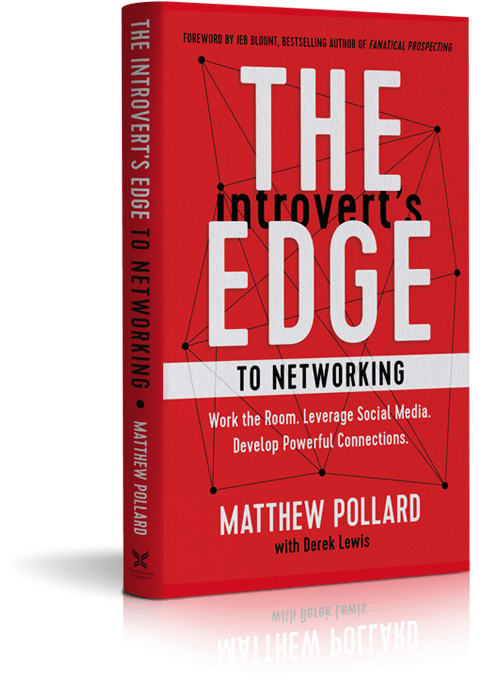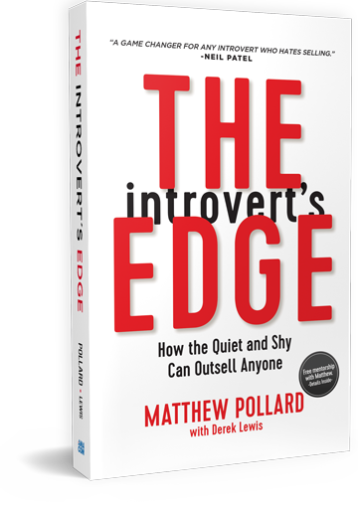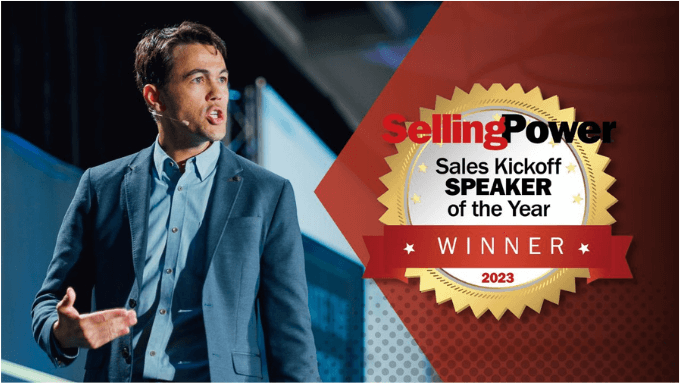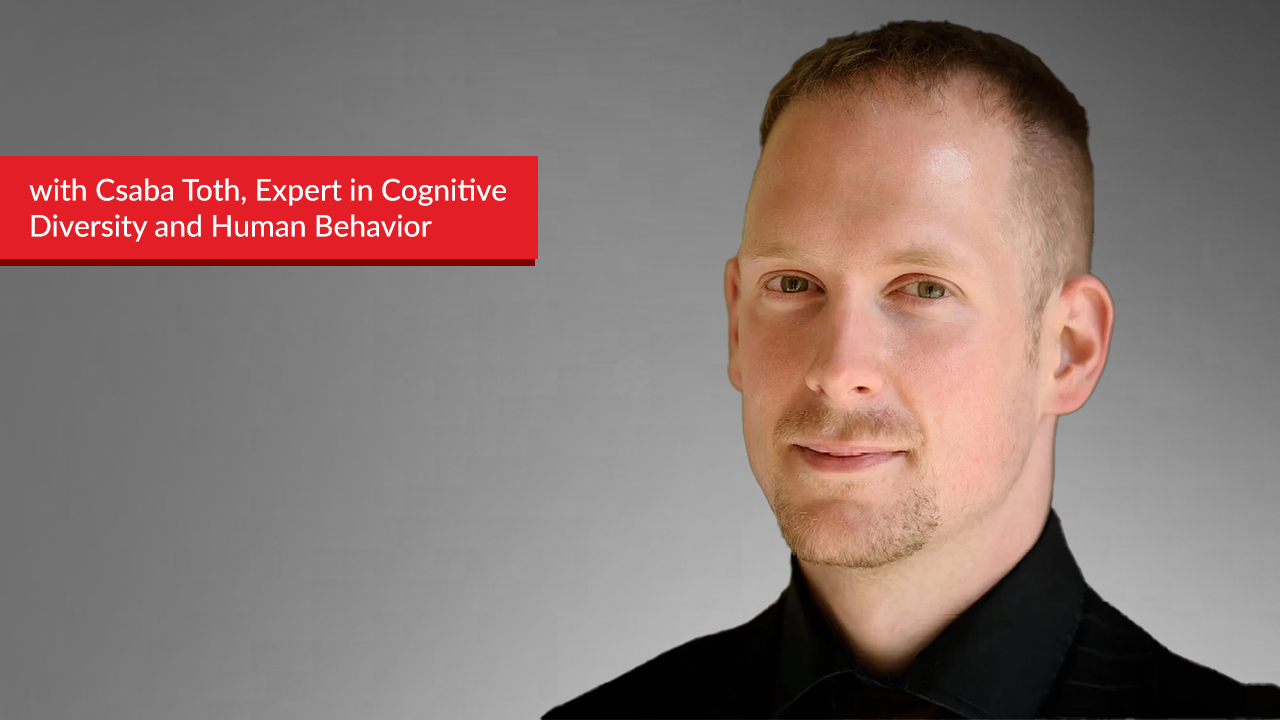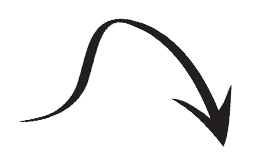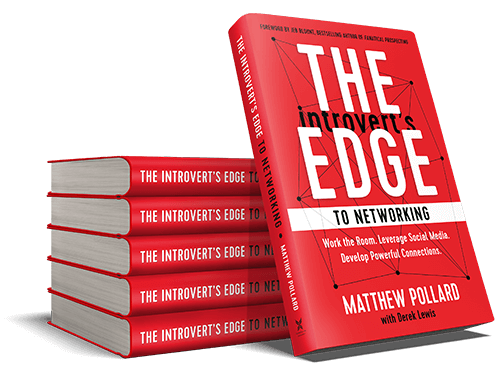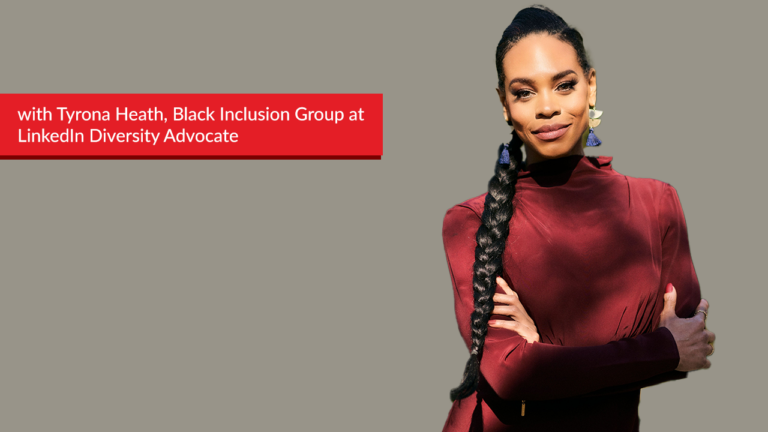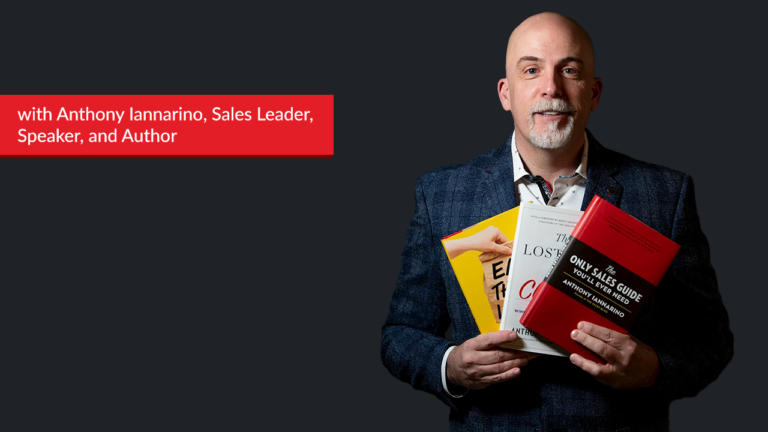Matthew Pollard: The Introverts Edge podcast was designed to create a dialog around introversion to stimulate a discussion around our disadvantage. It’s how we overcome those disadvantages and what we consider our introverts edge together. We’re finally going to confront the stigma around introversion showing that we’re not second class citizens. We’re just different, and we need to embrace that.
Hello, everyone, and welcome to the Introverts Edge podcast. I’m ecstatic to welcome my next guest because he is the author of an article that I mean, well, he wrote a post on this topic on LinkedIn and it got over a million shares. Just a ridiculous number of shares and likes and comments purely because he said silence does not mean incompetence.
I mean, I would have thought that that was a pretty obvious statement, but apparently this is a topic that is still absolutely important to bring to the forefront because a lot of people still think that confidence or competence comes from confidence, which is also absolutely not true. Now, our guest actually is part of the Forbes Council. He’s part of the Harvard Review Business Council as well.
And also he just specializes in helping people realize how to turn difference into synergy and more importantly, how to actually back that up with data. So you’re not just saying, I think it’s good for us. So without further ado I’m going to to welcome to the show chatbot thot chat kava welcome welcome to the show madam ecstatic to have you and I hope I didn’t butcher your name too much.
Csaba Toth: No, that was perfect. Thank you so much for having me.
Matthew Pollard: So we were just talking after the show and I put I hope people don’t mind me if the video watch is looking down on my notes of time, but as I do not butcher his name, do not butcher his name. And then we got to that point number. Oh, gosh, this the dyslexic. Dyslexic part of my means popping in.
So I want to make sure that people know upfront as we go into this podcast that you are not a an introvert yourself, you are a true. And often we kind of deep dive into this before the show because I find a lot of people that I first have a dialog with, they say, Oh, I’m extroverted. And then it’s not that they are extrovert, it’s they were introverted, but they decided State was to become extroverted, which I feel like is the total wrong solution.
But they now see themselves as that which cut it stops introverts believing that they can obtain success. And then there’s a lot of people that say they’re educated, but they weren’t true. And that’s a beginning. And so I’d love for you just because your whole background is really studying this concept and understanding it at a really deep level.
For those people that aren’t sure if they’ve become more extroverted, they’ve become more and perverted, or they are true introverts. How do you how do you define the difference and how do you, you know, help people understand it? There’s nothing wrong with either of those places. It’s just your natural personality type.
Csaba Toth: Well, personally, I don’t really believe that people can change it to preferences that much. It’s not like I wake up as an integral to Sutherland, actually, because that’s my decision. I don’t think that is true because our preferences are really stable, but our behavior depends on the context. So this is what we need to understand, that once you take a psychometric assessment and you learn about your preferences, then instead of using that as an excuse, we can actively work on our comfort zone to enhance our behavior and cognitive flexibility.
So you just push that comfort zone a little bit more so we learn new skills because being extroverted means that I gain my energy from interacting with other people. But how do you know that you can see that in terms of the behavior? People are more animated, they are more talkative, but we can learn those skills then, because that is a set of behaviors that we can learn.
Is it draining for an introvert? Of course it is. But you can do that. And that is the whole point that we can learn to push the boundaries. And it’s about leveling up exactly what you said. We don’t have to level up because we don’t like something because we are not good enough, because often coaches talk about transformation.
It’s so exciting. Yes, it is for you. But people on the other side here, Oh, no, I’m not good enough. That’s going to be too much hassle. Nobody likes that. But when you talk about leveling up, you know, that’s coming from the gaming industry, then you play a video game, you learn new skills at the end. You have to destroy that monster.
If you don’t, you start over. If you do, you go to the next level. And most people don’t do that. They start over pit on level up because there’s always somebody else to blame. So that’s how we talk about leveling up. And then we can do that. It’s almost like, you know, you can learn how to swim, you can be a really good swimmer, but it doesn’t make you a fish.
Matthew Pollard: And that’s why technically, you know, it’s funny, I remember the there’s this image that I share on social media from time to time, and it’s like this teacher at the table and the students are an elephant, a monkey, a fish. And they’re like, okay, So the test today is we’re all going to climb this tree. Now, of course, there’s certain people, certain animals would be better or worse.
And I think the same comes from an introvert extrovert. And there are certain things that each group is definitely better at. I mean, try and get an extrovert to sit in a room and write a book. They find it really difficult because they need it. They charge time. But talking about, you know, I’m an introvert, but don’t worry, I’m an extrovert now, like firstly highlighting that there’s something wrong about being introverted, which is kind of like, you know, putting, saying, I don’t like the fact that I’m a great listener saying, don’t worry, I’ve learned not to listen now.
I’ve learned not to be more empathetic. And on the flip side, those are skill sets that extroverts can learn. But the desired style isn’t to become more introverted. It’s to find your way to to this more and perverted space where you, you know, you you feel that your energy isn’t depleted as much for networking, but you’ve learned how to have those, you know, those initial social discussions.
And from the extroverted side that you can have those initial social conversations, but you also actually listen to what they say and you respond with empathy and understanding. And I feel that so many people look down their nose at the introverted space that they don’t realize that there’s huge strengths there and there’s so many people that are introverted that then say, Oh, now I’m devoted, so I’m not going to advertise that I’m introverted or now I’m extroverted because there’s something wrong with being introverted and I know you specialize in you know, really understanding that if you like the cognitive diversity of an organization, do you find this clouding of understanding really a massive inhibitor to
even getting started with trying to lean into everybody’s strengths?
Csaba Toth: Yes. And first of all, what you described is really important because we don’t change our personality, but we can learn how to flex our behavior. And that’s the most important part, because nothing is wrong with us. You know, one person is not better than the other one. The worst one is the rigid one, because if something is rigid, it breaks.
So it doesn’t matter what kind of profile you have. If you are not flexible, if you don’t learn how to flex your behavior style and your communication style, then you create a huge mindset. And that’s exactly what we do. What we can measure it, because probably you had this feeling when you were talking to someone and you thought, Oh my God, that person has no common sense at all.
They don’t get you. But we never think about the fact that they feel the same way about us, but for different reason. The level of pain and frustration is the same. The reason is different. And that’s exactly our topic, because both I understand why people do what they do, then it’s easier to tolerate it. It’s easier to feel empathy, not without it.
And that’s what we have to focus on technically, what we call the uncommon mindset that you are able to see the same situation from different perspectives so you can make better decisions and then you can choose to respond instead of just reacting. So it sounds good, but in a corporate environment is difficult because what happens when two people disagree?
That’s hard, but that’s exactly where the potential lies for success or disaster. And that is the reason why cognitive diversity is the only layer of diversity that has proven benefit in terms of performance because it feels horrible, it feels uncomfortable. It’s something that most of us need to learn about. It’s not natural to me. Definitely wasn’t. I had to learn because most of the world didn’t make sense to me, and probably that’s why I ended up in this field.
Matthew Pollard: That’s interesting. You know, one of the things you talk about, you talk about three common reasons why potential is lost in a team. And I want to talk about the other two in a minute. But I actually think that I want to start with the best case. Worst case scenario. So you’ve got an organization that then hires a huge, diverse team.
And I love the fact that we’re getting beyond, you know, gender and race and religion, and we’re starting to get into the cognitive space, which, you know, is a huge driver of getting out of groupthink and competitive advantage. And I, I can’t believe that organizations keep trying to blend everybody into that extroverted mode when truthfully extroversion is not the key to success.
So I think that the problem that I see, though, is that while, hey, job professionals are getting to the point where they’re trying to create diverse teams and they understand the advantages of that, they have a workforce that in a lot of ways isn’t ready for that. They want to bring everybody back to group things. They want to really, you know, drive everybody to speak out loud.
And they do see confidence as competence and the quiet people, as the people that aren’t contributing or that they they just don’t seem to understand or they are just not as motivated. And so we have this kind of tug of war situation, I would say, between organizations that have a more developed air space where they are trying to lean into that competitive advantage with an organization that hasn’t really figured this out yet and how to really, you know, drive success from this.
They’re not ready for it. And that’s actually a I mean, it’s going to cause retention issues. It’s going to cause productivity issues for those people that are listening. I want to I want you to answer this question. I hope you don’t mind me asking two questions at once, but for the people that are in an organization that feel like they could add that kind of cognitive diversity, but their manager isn’t allowing for it, what advice would you give them?
And then from the other direction, if you’re a manager and you feel like you’re struggling to really let in those people that have cognitive diversity because you try to drive people the same way, what advice would you give to both of those groups?
Csaba Toth: So of course there is an overlap and that leads us to the other two invisible forces that we talk about because cognitive diversity is just the potential, because it doesn’t it’s not automatic, like you said, because you can employ a bunch of people who think and behave differently. Probably they are going to clash. It’s going to a bloodbath.
So can you make it work? That’s a different story. But you have to create the right environment and that is a psychologically safe motivating environment because maybe you have that the the selection of opinions in your team. But if people don’t speak up, if that opinion is not appreciated, it’s not a value and it’s punished and people stay quiet.
And that’s the problem with that, because in every single company there is a norm that most people conform to. So the real question is how big is the mindset gap between what is natural to you and what is normal and expected around you? That’s really important because that shows the level of inclusion. So from a managerial perspective, it is important to create the space.
But often when we talk about psychological safety and we talk about the external environment, but that takes away the power from people because we have to give back the agency, because your sense of psychological safety and motivation depends on you, how you perceive something. And let me address that introverted people feel less safe than the extroverted ones, and that’s normal.
So instead of shaming the company into inclusion, maybe those people need more coaching, need more support so they can reframe that experience and then the outcome is something positive. But they just have to acknowledge the fact that it’s going to be uncomfortable because what you can read about that we love diversity, we celebrate diversity. You know, when when I did a workshop for BBC, they had 17,000 employees and they said, we celebrate and tolerate diversity.
And I said, That’s fantastic. So much better than hating people. But you cannot turbocharge your car by celebrating your engine. That’s not enough. You have to understand how the different parts work together so you can optimize them. And that’s the beauty of it. But what happens then? Often companies employ a lot of different people and that they teach them how to be normal.
They call it onboarding. This is what we do. Why? Because fantastic, good shit. And that’s how we lose the power of diversity. So we just have to understand that it’s going to be uncomfortable in the beginning, but we also understand that that the feeling of discomfort is a sign of growth, then we can deal with it.
Matthew Pollard: That’s interesting. You know, I’ve actually had a almost allergic reaction to that statement that you said we we celebrate and tolerate diverse people because celebrate, I understand tolerate is a terrifying word. It’s almost like they the culture is saying will tolerate you until we can convert you, bring you into the fold of who we now are and bring you into groupthink, which is almost a lack of understanding of, you know, the benefits of diverse thinking.
And it gets me it gets me thinking about personality tests, because when I think about a personality test, I mean, when you have somebody of a different gender, a different skin color, it’s I mean, it’s not easy to hide that on, you know, on your application. But a lot of organizations, they’ll do personality tests for, you know, when they’re hiring staff to see whether they’re going to be a great culture fit.
And the first thing that comes up, if I was an introvert, especially if I was applying for a sales role, but if any role really if I was looking for a leadership role, a lot of organizations could probably still punish me or consider me not a fit for their organization if I don’t take that extroverted confidence box. Do you find because I mean, one of the things that I love about your body of work is that you really focus on data, and if you can’t measure it, then it’s just a guess.
And yet from a lot of the data that I’m assuming that a lot of these hire people in my job that are making hiring decisions, that data can in a lot of ways be manipulated. I mean, I can even think and I haven’t you know, I haven’t worked for an organization since I was 19, but I would imagine that if I was trying to apply for a job and I wanted to be in leadership, I wouldn’t take the risk of answering a question that could perhaps trigger the introversion part of that psychological test.
Do you find people manipulating their answers because there isn’t that psychological safety, even from a point of answering the test questions?
Csaba Toth: Yes. And I also wrote an article about this, and the title was something like Psychometric Discrimination. And that was exactly the topic that I think people need to like because companies use these assessments in the wrong way, because these psychometric assessments do not measure skills and competency, they measure preferences and it’s not the same thing. And that’s the problem.
If you don’t fit the profile, you cannot get this job. I mean, that is just insane. That has nothing to do with science that’s unbelievably biased, backed up with data because, you know, they can see a number, they can see report. So it looks scientific, but if you don’t know how to use it, then the outcome is going to be negative.
That’s the problem with that. So in that case, yes, you’re right.
Matthew Pollard: You know, it’s interesting because when I talk to people about yeah, but I just prefer to hire extroverts because they just they’re so much more natural at getting into sales. And I’m like, okay, well, I understand this and I know we’ve got another interview coming up on the introverted seller Summit. I can’t wait to dive deeper into this because I also think that there’s a huge difference from an introverted seller perspective on intrinsic motivation and the requirement for believing in the organization.
But when they when I hear things like that, I’m like, okay, so just so I’m unclear then if Zig Ziglar came for an interview at your organization, if he was still with us, you wouldn’t hire him then. And of course, we’d ask Ziglar to make. But Zig Ziglar is an introvert, so how could you not acknowledge that and embrace that into your culture?
So I really feel that when you talk about it is Hotjar. How do you start to bring this rigid structure of they have to these boxes for these roles and these are the characteristics to a much more. Let’s have an open conversation and look at the potential of every person and and how we can see each persons as individuals with skills gaps, not deficits.
How do you start to bring that into place of, as you put it, psychological safety, where i.e., they feel psychologically safe to answer the questions correctly, but then also feel psychological, safe to be their natural self when they when they start work.
Csaba Toth: I think it comes down to education. And the problem is that our field is full of outdated and incomplete ideas that can cause more harm than good. And to be in this, that is the reason why I published my book. That’s why I do a webinar every single month so people can attend it and then they can ask better questions so they can make better decisions because a lot of companies are selling what they have, not what the clients need.
And that’s a big problem. So we have to focus on that definitely because most people don’t do anything until it hurts enough. So we know even that people probably have a good intention and they think they are doing the right thing because they heard something so many times that they believe it. It’s just not true. So it comes down to education.
So once they understand that this is about the preferences and then based on those preferences, we can expand the comfort zone and we can focus on the skills, then it makes sense because they cannot be rigid. That’s the whole point. Because how many times I heard that we love diversity? Yes, you do, but your brain doesn’t because it means unpredictability.
The brain doesn’t like that that hates it. So if I know that that is the starting point, I also know what to do about it. Because the more I understand myself, the more I understand other people who think and behave differently, the more inclusion I can create. Because the more predictable and familiar those people become. And that’s the reason why we have to learn about what do introverted people need and what about the extroverts?
Because they don’t do those things because they want to be annoying on both sides of the spectrum. They don’t do that. These are preferences, they are not optional, they need it. And yes, you can go against your values and needs, but for how long and at what cost? So it makes much more sense to walk every day a little bit so you don’t have to run tomorrow.
And that’s exactly our topic. So instead of using it as an excuse, let us work on it so it becomes more flexible. But a lot of people don’t know about this topic, and that’s why I’m so happy that we can talk about this, because there are a lot of popular ideas that are just not true.
Matthew Pollard: Look, I think that’s really helpful for people to hear, and I’m just imagining a couple of people that are listening to this that are in that place of leadership that perhaps have kind of maybe they even say, you know, I used to be introverted, but now I’m extroverted because they saw that as their desired effect. And maybe they’re leading now in a way that isn’t creating psychological safety for their other introverted team members, but also is perhaps allowing these non-inclusive behaviors to kind of spread into their team.
And I’m also imagining these big extroverts that have teams. Maybe they’re listening to this and I get a lot of listeners like this that are trying to create a place for introverts in their organization. They just have no idea how to do it. Maybe they’ve been tolerating this behavior because they’re like, I’m trying to help these people. But, you know, I obviously have to pander to these strong personalities for those people that feel that they haven’t been creating that place of psychological safety for their team, what advice would you give them to start that process?
It would it be an open dialog with their team about the fact that they’ve not been doing this and they want to do it, or that there’s nothing wrong with introversion or extroversion or, you know, what steps would you suggest they follow to start to unwind this kind of uncomfortable situation they’ve created for themselves and their team?
Csaba Toth: So we have a full step process to do that. First, we have to measure it, and this is when they take the assessment so we know exactly who’s in the team. We know the psychological safety, the motivation and cognitive diversity. We’re not guessing. We are measuring. And then step two, visualize it. Discuss the result with the team. Because let’s be honest, it’s really difficult to talk about something you are not aware of.
You know, often coaches say that, oh, just reflect on it. But it doesn’t matter how much you reflect on how to say good night in Chinese. If you don’t speak Chinese, you know, it doesn’t matter. So we have to give people the vocabulary and the frame of reference so they can discuss it, so we can create meaningful conversations driven by data.
Nothing can replace that. And then step three, now we can adjust the root causes because often the biggest distrust between two people is misunderstanding. And we can reveal a lot of things during these conversations. And then step four is when you can grow. We co-create the next steps. Without it, it’s very difficult because often people rely on common sense and good intention.
But it can backfire because statistically, at least half of the world is very different from you. They are very different in terms of how they deal with conflict, how they gain their energy, very different, but equally different. But once I understand that it’s easy, another problem is that the values are binary. If something is good, then that exists as well.
So that’s how we put everything on a sliding scale, because life is not binary, life is not black and white. You can put everything on a sliding scale and that is the real question. How big is the mindset gap between you and me, you and your team, you and your country? Because it depends. Your personality determines how you want to behave, but your environment determines how you have to behave.
And if that gap is too big, it can be draining. And each of them just coping and mirroring other people’s behavior. Once I understand what they need, what they want to avoid, and how we can build trust, because that can be very different from our best practice, then we can make it happen. But this is something that we need to learn, at least most people.
I wasn’t that lucky.
Matthew Pollard: I think that’s really helpful for people to hear. And if you’re in an organization, I mean, if you’re in an organization that is doing a lot of these tests, that’s great. As long as you’re anchoring that there’s nothing wrong with whatever school you get or whatever result you get. Everyone has strengths and weaknesses and empower people before they do those tests.
If they’re if you’re in an organization that doesn’t have these tests as part of the organization, there are lots of free tests. Of course, there’s some paid ones which offer a lot more detail and a lot more value, but there are some free tests to at least start the dialog about who everybody is and not what strengths and weaknesses people have and what strengths and skills gaps.
People have to be able to start on repairing the relationships you have with your team and then starting to provide increased value to each member in the way that they need it. And I think that’s what’s so powerful. And I can’t wait to to interview interview you on the introverted Sela Summit. And for those people that haven’t registered yet, it’s on October 9th and you can go to the introverted seller summit dot com and I can’t wait to really dive deeper into the sales specific world because I think that if you’re thinking about a group that doesn’t embrace their introverted sell their introverted people, that is the sales departments usually because everybody knows introverts can’t
sell except for the fact that many of the best ones happen to be introverted. So I can’t wait to start to look at that. But for those people that are experiencing you and your content for the first time, what’s the first resource that you would suggest people go to to really learn how to create or I guess, leverage this cultural and cognitive diversity with inside their organizations?
Csaba Toth: The best way is probably connecting on LinkedIn because I do a lot of updates and that’s why I post or the articles, maybe the uncommon sense in unusual times. My book, which comes with £500 worth of resources that includes assessment and it’s just like an interactive book. You can read a chapter and then there’s an online program so you can experience it because learning is experiential.
So you have to practice what you preach. And at the end there’s also a certificate. So to me that’s an investment in a better future and probably that will be the starting point.
Matthew Pollard: That’s perfect. Mike, I so appreciate you sharing this and I can’t wait to finish this interview in a deeper dive into the sales world as well. But for those people that are checking out this podcast and haven’t registered yet, please go and do that. But for today, thank you so much for checking out this episode and I look forward to seeing you in the next episode of The Introverts Edge podcast.
Cheers, everyone.







